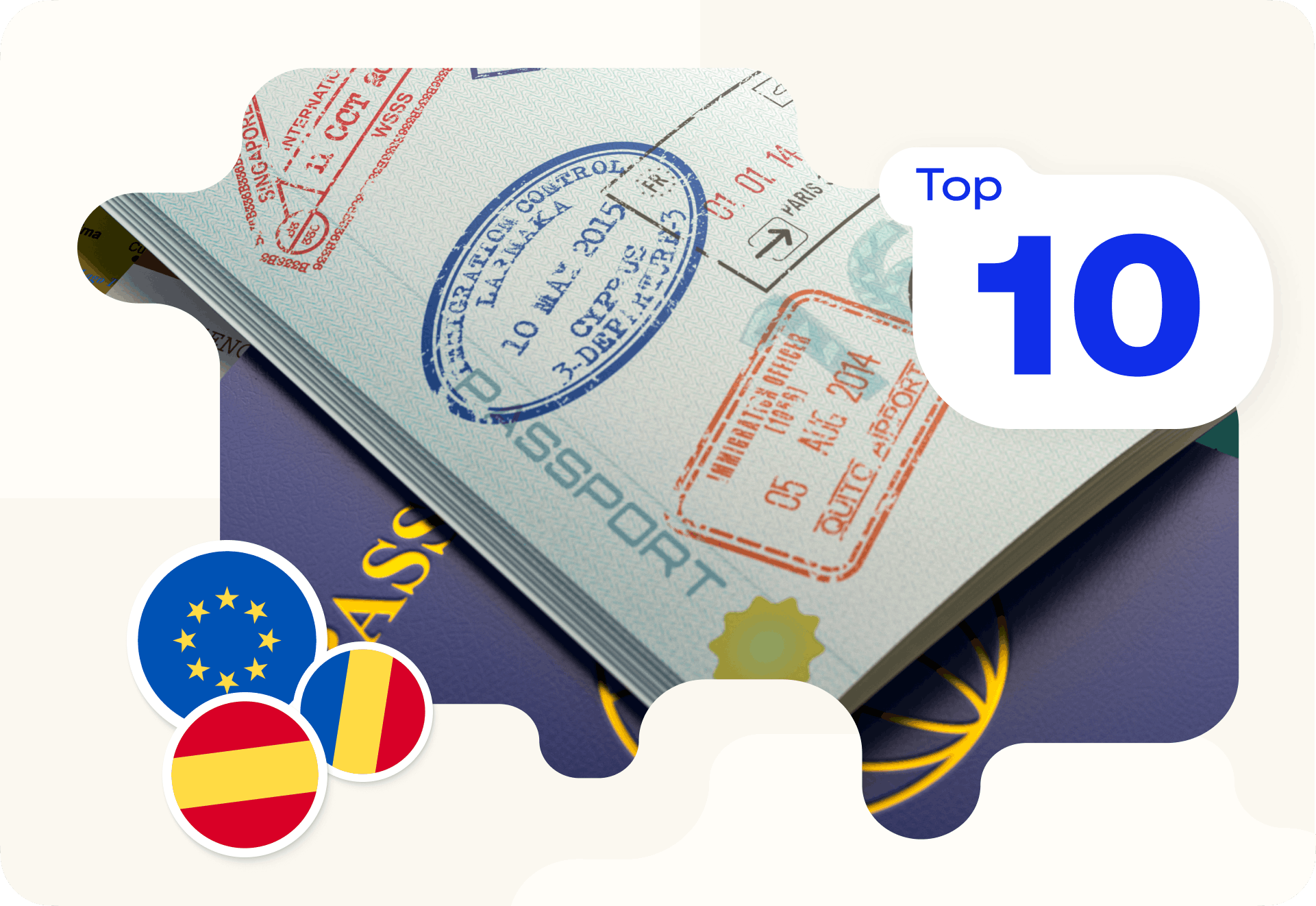The globalized modern world makes it possible to live anywhere in the world as a 'digital nomad'. While digital nomads often remain on the move, it is normal for them to have a preferred zone or area. Europe (and mainly the Schengen area) remains a popular choice for digital nomads to set up base, with its rich culture, scenic landscapes, and inclusive work opportunities.
In this useful guide, we highlight the top 11 European countries that legally accept the hiring of talent that possess a digital nomad visa and lay out the main things to look out for to help you streamline your hiring and workforce relocation plans.
#1: Croatia Digital Nomad Visa - For talent in communication technology
Croatia currently provides digital nomad visas, offering a one-year residence permit to travelers. The country limits its digital nomad visa policy to non-EU citizens who run their own businesses (including foreign-registered companies) or as remote workers for a Croatia-based organization.
Croatia's digital nomad visa requirements
Applicants must earn a monthly income of about €2,300 and pay an estimated application fee of €60. Croatia’s digital nomad visa lasts for a year with the opportunity for renewal.
Benefits
Digital nomads in Croatia are not subject to income taxation.
#2: Czech Republic - Open for local work relations
Czech Republic’s digital nomad visa is actually a long-term work visa, known locally as the ‘zivno’ visa, which offers work opportunities to non-EU citizens. The nation’s digital nomad visa makes it easy for business owners and freelancers to collaborate professionally with local organizations.
Digital nomad visas requirements
Applicants must pay an application fee of €102 and have a working relationship with a Czech-based company. The ‘zivno’ visa remains valid for six months right up to a year.
Benefits
The income requirement isn’t recurring, like for most other European countries on the list. Applicants only need to maintain a minimum sum of €5,000 in their registered bank account. Also, the non-conventional ‘zivno’ visa allows applicants to work with Czech companies and offers free access to countries within the Schengen area.
#3: Greece Digital Nomad Visa - Historic land of modern work opportunities
Greece opened its doors to digital nomad visa arrangements that enable remote workers and business owners to work within its shores. The Greek digital nomad visa is also known as Greece nomad visa.
Greece's digital nomad visa requirements
Applicants need to pay an application fee of €75€75 and earn a minimum monthly income of around €3,500. The visa remains valid for up to a year and applicants may extend their stay with a temporary residence permit. Also, it is important to note that digital nomad visa holders are not legally permitted to work or freelance for a Greek company under the arrangement.
Benefits
The application fee for the Greek digital nomad visa is relatively more affordable than in other European countries.
#4: Norway - Work with mountain vista backgrounds
Norway offers digital nomad visas to eligible non-EU residents, with opportunities for residence permits and independent contractor arrangements.
Digital nomad visas requirements
Applicants need to pay an application fee of €600 and submit documents that prove a minimum monthly income of €3,000. An applicant must also have an existing working relationship with a Norway-based client.
Benefits
Norway’s digital nomad visas remain valid for up to two years, longer than most other European countries. Also, applicants are legally permitted to remotely collaborate with Norway-based companies.
#5: Portugal - Warm climate, low cost of living, and welcoming culture
Portugal offers digital nomad visa opportunities to non-EU citizens, where they can stay and work temporarily (up to one year) or permanently (with a residence permit). This is a great opportunity for business owners, freelancers, and remote workers of foreign companies.
Digital nomad visas requirements
The country’s digital nomad visa application fees vary by nation, with an average cost of €90. Applicants must show proof that they earn a minimum monthly income of €3,040.
Benefits
Portugal’s most notable benefit for digital nomads is the preferential tax rate: Income generated from foreign sources is not taxed at all, while domestic income is taxed at just 20%. Considering that income taxes in Portugal can go up to 48%, this is significantly lower than usual. Digital nomads can enjoy a high-quality lifestyle while keeping more of their hard-earned income, it is a safe and expat-friendly nation and has become one of the most preferred destinations for digital nomads.
#6: Spain Digital Nomad Visa - An Iberian paradise
Spain offers digital nomad visa opportunities to non-EU citizens, where they can stay and work (with non-Spanish companies) in the Iberian country. The opportunity extends to business owners and remotely hired individuals.
Spain's digital nomad visas requirements
The country’s digital nomad visa application fees vary by nation, with an average cost of €80. Applicants must show proof that they earn a minimum monthly income of around €2,334. Spain also requires digital nomads to prove expertise or academic background in their specific industry or field.
Benefits
Spain offers one of the longest digital nomad visa validity periods, allowing extensions of up to five years. Eligible digital nomads can receive tax breaks for the first four years of their stay, as long as they earn below the cap of €600,000 per year. The long-term perks offered by Spain have made it one of the top countries visited by digital nomads.
#7: Hungary - A multicultural hub
Hungary offers digital nomad visas, also known as The White Card, to non-EU citizens, which applies to business owners and individuals remotely hired by a non-Hungarian company.
Digital nomad visas requirements
Hungary’s digital nomad visa applicants must pay an application fee of €110 and earn at least €2,000 in monthly income. Successfully applied visas remain valid for a year with the opportunity of extension on a case-by-case basis. Also, applicants must remain within the country for at least 80 days within a 180-day period.
Benefits
Visa holders in Hungary receive an income tax exemption for the first six months of their stay.
#8: Cyprus - An Island full of opportunities
Cyprus offers digital nomad visas to non-EU citizens for freelancing work with non-Cyprus clients. The Mediterranean nation increased its visa cap from 100 to 500 in 2022.
Digital nomad visas requirements
Applicants must pay an application fee of €70 and have a minimum monthly income of €3,500. Successful visas remain valid for a year, with the opportunity to extend for two additional years.
Benefits
Applicants can bring their immediate family members with them for their stay. However, family members aren’t permitted to work remotely from the island nation.
#9: Iceland Digital Nomad Visa - For high earning nomads
Iceland offers digital nomad visas for a short period of half a year. The Nordic country provides a diverse range of co-working spaces conducive to freelancing work and running a remote business. The country is mostly suited for top-earning digital nomads due to its high minimum income requirement.
Digital nomad visas requirements
Applicants of Iceland’s digital nomad visa must pay an application fee of €88 and submit supporting documents that prove a minimum monthly income of €7,075. The visa allows applicants to stay in the country for up to six months based on the purpose of remote work.
Benefits
Iceland exempts visa holders from income taxation for their work during their stay. Also, the country has one of the lowest crime rates in Europe.
#10: Romania Digital Nomad Visa - A Forested retreat
Digital nomads can apply for a remote work visa in Romania. The offer extends to international travelers including non-EU citizens.
Digital nomad visas requirements
Romania has a unique income requirement for digital nomad visas, with average earnings three times the gross monthly average salary in Romania, which amounts to roughly €3,700/month. Visas stay valid for a year.
Benefits
The country has one of the fastest internet connections in the world, which can help boost remote communications and collaborations.
#11: Italy Digital Nomad Visa - Rich culture and culinary delights
Since April 4th 2024, Italy also embraces digital nomads from non-EU countries. Italy's digital nomad visa is aimed at highly skilled workers.
Requirements for Italy's digital nomad visa
Eligibility criteria include a minimal annual income of roughly €28,000 and a valid health insurance covering the whole stay. Digital nomads in Italy also need to present proof of adequate housing in Italy and at least 6 months of remote work experience.
Benefits
The digital nomad visa for Italy is valid for a period of one year. It can be extended annually if the conditions that allowed the visa to be issued persist. Italy is known for its delicious mediterranean cuisine, incredible landscapes, and rich culture which make it an increasingly popular destination among digital nomads.
General digital nomad visas requirements
Aside from the specific criteria outlined for each nation, applicants should also prepare the following:
- Application form: Applicants should submit the form either in-person or online to the administrative body of the respective country.
- A valid passport: An applicant's passport should have a validity date of at least six months after the return date.
- Documented proofs: These documents prove a digital nomad's purpose of staying in a country and may include income statements, letters of employment, and work contracts.
- Cover letter: A detailed cover letter should clearly explain the purpose of the digital nomad visa, declare the fulfillment of each country's requirements, and other relevant information.
- Health insurance: Applicants should submit proof of health insurance coverage for the entirety of their stay.
With over 35 million digital nomads worldwide and counting, more European countries may soon offer attractive visas that target the mobile workforce. Partnering with Localyze makes global mobility easier than ever, with dedicated case managers equipped with the skills and knowledge to expedite your workforce relocations.



